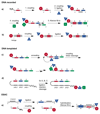DNA-encoded chemical libraries - achievements and remaining challenges
- PMID: 29683493
- PMCID: PMC6126621
- DOI: 10.1002/1873-3468.13068
DNA-encoded chemical libraries - achievements and remaining challenges
Abstract
DNA-encoded chemical libraries (DECLs) are collections of compounds, individually coupled to DNA tags serving as amplifiable identification barcodes. Since individual compounds can be identified by the associated DNA tag, they can be stored as a mixture, allowing the synthesis and screening of combinatorial libraries of unprecedented size, facilitated by the implementation of split-and-pool synthetic procedures or other experimental methodologies. In this review, we briefly present relevant concepts and technologies, which are required for the implementation and interpretation of screening procedures with DNA-encoded chemical libraries. Moreover, we illustrate some success stories, detailing how novel ligands were discovered from encoded libraries. Finally, we critically review what can realistically be achieved with the technology at the present time, highlighting challenges and opportunities for the future.
Keywords: DNA; DNA-encoded chemical libraries; combinatorial chemistry; drug discovery; high-throughput DNA sequencing.
© 2018 Federation of European Biochemical Societies.
Figures



References
-
- Goodnow RA, Jr, Dumelin CE, Keefe AD. DNA-encoded chemistry: enabling the deeper sampling of chemical space. Nat Rev Drug Discov. 2017;16:131–147. - PubMed
-
- McCafferty J, Griffiths AG, W G, Chiswell D. Phage antibodies: filamentous phage displaying antibody variable domains. Nature. 1990;348:3. - PubMed
-
- Winter G, Milstein C. Man-made antibodies. Nature. 1991;349:7. - PubMed
Publication types
MeSH terms
Substances
Grants and funding
LinkOut - more resources
Full Text Sources
Other Literature Sources

